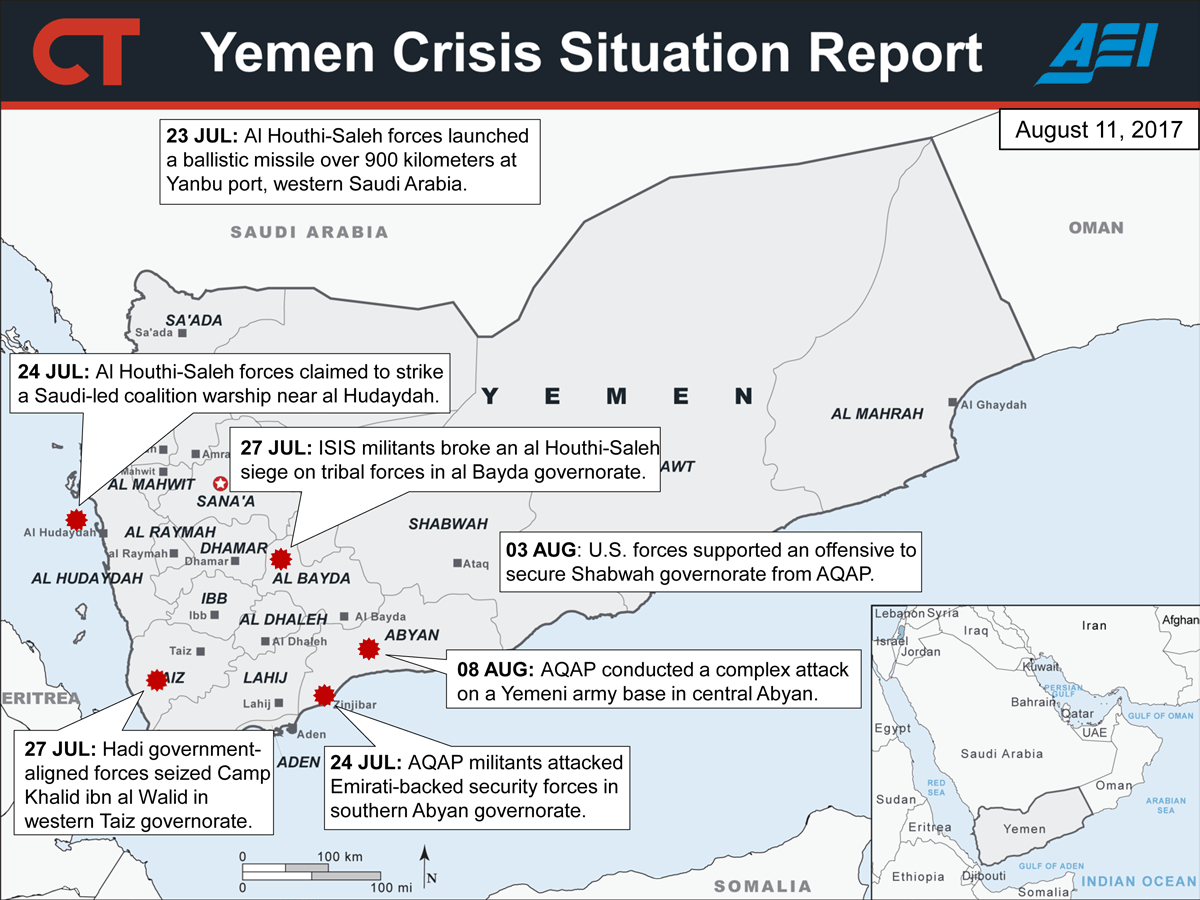A new military offensive against al Qaeda in the Arabian Peninsula (AQAP) in eastern Yemen will disrupt the group’s operations but is unlikely to weaken it over the long term as AQAP continues to expand in key terrain in central Yemen. The political processes in play are unlikely to mediate a resolution to the civil war.
U.S. and Emirati special operations forces supported a Yemeni military offensive to secure major population centers and energy infrastructure from AQAP in eastern Yemen in early August. The operation disrupted AQAP’s ability to operate in Shabwah governorate. An estimated two thousand Shabwani Elite Forces, UAE-trained local tribesmen, deployed from positions in neighboring Hadramawt governorate to conduct clearing and counterterrorism operations in Shabwah. U.S. forces are enabling the operation through surveillance, aerial refueling, close air support, and forces on the ground to degrade AQAP’s external attack capability and remove Shabwah as a major safe haven for the group, according to Pentagon spokesman Jeff Davis. The Shabwani Elite Forces are flying the South Yemen flag and there are reports emerging that Ahmed al Issa, who is part of President Abdu Rabbu Mansour Hadi’s patronage network, is already negotiating contracts for the energy infrastructure. AQAP was prepared for the operation. AQAP militants withdrew from Shabwah into Abyan governorate to the west as security forces advanced, similar to the AQAP withdrawal from al Mukalla in April 2016. It issued multiple statements on social media in the month leading up to the operation emphasizing the importance of withdrawing when faced with a greater force. (AQAP statements obtained through Telegram or translated by SITE.)
AQAP launched a counter-offensive targeting Yemeni units in rear areas to disrupt the ongoing operations in Shabwah. AQAP militants conducted a suicide vehicle-borne improvised explosive device (SVBIED) attack on a military base in Jahin, Abyan on August 8. The Yemeni 103rd Infantry Brigade had deployed to Jahin, along the road from Shaqra to Lawder in eastern Abyan, on July 30. The unit continued an advance toward Lawder, where the 115th Infantry Brigade is stationed. Emirati-backed al Hizam forces and Yemeni army units are attempting to secure the governorate but claim they are ill-equipped. Yemeni security forces withdrew from large parts of Abyan in early 2017.
The Islamic State of Iraq and al Sham (ISIS) may be strengthening in al Bayda governorate in central Yemen. It claimed more attacks between July and August in al Bayda than it claimed in previous months. ISIS Wilayat al Bayda militants participate in operations against al Houthi-Saleh forces alongside AQAP and tribal militias. Emirati-backed security forces largely dismantled ISIS’s attack cells in southern Yemen but the group retained a small footprint in central Yemen where the Saudi-led coalition does not operate. (ISIS statements obtained through Telegram.)
Iran and its network are providing the al Houthi-Saleh faction with capabilities that increasingly threaten Saudi Arabia. The al Houthi-Saleh faction launched ballistic missiles deeper into Saudi Arabia and at a higher frequency than previously. The missile components are likely smuggled in small shipments from Iran into Yemen, where weapons experts assist the al Houthi-Saleh faction with modifying and improving their current stock. Al Houthi-Saleh forces are also targeting Saudi-led coalition ships with a combination of remote-controlled explosive boats and surface-to-ship missiles at an increased rate. The faction almost certainly lacks the ability to develop these capabilities without external assistance. Reuters reported that Iran moves materiel and funds by transferring supplies to smuggling boats in Kuwaiti waters before moving them overland into Yemen.
The U.S. renewed its diplomatic effort to mediate a political resolution to the Yemeni civil war through the UN-led process. U.S. Ambassador to Yemen Matthew Tueller announced that the U.S. will lead an effort to restart UN negotiations, which have largely collapsed. The U.S. seeks to split former Yemeni President Ali Abdullah Saleh from the al Houthi movement, as indicated by Amb. Tueller’s statement praising Saleh and criticizing the al Houthi bloc. The al Houthi movement views the UN process as co-opted by Saudi Arabia and has banned the UN envoy from entering northern Yemen. Al Houthi-Saleh officials are open to diplomatic efforts to resolve the war. Saleh Ali al Samad, head of the al Houthi-Saleh Supreme Political Council, and former president Saleh met with the European Union’s Ambassador to Yemen Antonia Calvo Puerta in early August to discuss political negotiations.
The humanitarian situation is rapidly deteriorating in Yemen. The international response will do little to reverse the conditions. Water treatment infrastructure to stem the spread of cholera is now damaged or was not present, for example. The UN halted a planned shipment of one million cholera vaccine doses to Yemen, citing the need to use the treatment in areas where it had a chance of being effective. An estimated 20.7 million Yemenis are in need of humanitarian assistance, 9.8 million of whom are in acute need to survive.
The Emirati-backed offensive in Shabwah is unlikely to remove AQAP’s safe havens in Shabwah permanently, and AQAP and ISIS will continue to strengthen in areas outside of the influence or reach of the Saudi-led coalition. The U.S. should recognize that the UN-led peace process has failed and that the UN cannot deliver a political resolution to the war.

